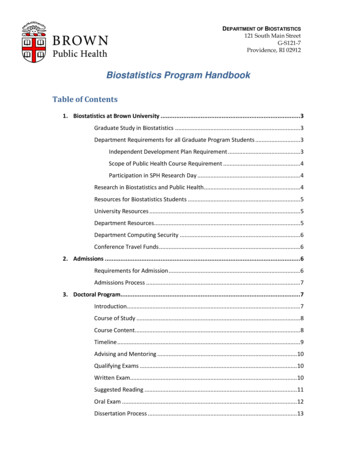
Transcription
DEPARTMENT OF BIOSTATISTICS121 South Main StreetG-S121-7Providence, RI 02912Biostatistics Program HandbookTable of Contents1. Biostatistics at Brown University . 3Graduate Study in Biostatistics . 3Department Requirements for all Graduate Program Students . 3Independent Development Plan Requirement . 3Scope of Public Health Course Requirement . 4Participation in SPH Research Day . 4Research in Biostatistics and Public Health. 4Resources for Biostatistics Students . 5University Resources . 5Department Resources. 5Department Computing Security . 6Conference Travel Funds . 62. Admissions . 6Requirements for Admission . 6Admissions Process . 73. Doctoral Program. 7Introduction. 7Course of Study . 8Course Content. 8Timeline . 9Advising and Mentoring .10Qualifying Exams .10Written Exam.10Suggested Reading .11Oral Exam .12Dissertation Process .13
Selecting a Dissertation Chair/Advisor .14Composition, Selection, Function of Dissertation Comt. .15Outside Readers .15Other Requirements for Doctoral Students .16Research Assistantships .16Teaching Requirements.18Fellowships .18Journal Club and Faculty Forum .19Annual PhD Research Presentation.204. Master of Arts (AM) and Master of Science (ScM) Program . 20Introduction.205th-Year Master’s Program .20Common Course Requirements for AM & ScM.21Health Data Science Track of ScM .22Minimum Grade Requirement for Graduation .22Thesis/Project Requirements for ScM Degree .22Master’s Research Apprenticeship Appointments.235. Seminars and Working Groups . 24Brown Statistics Seminars .24Working Groups .246. Academic Policies and Procedures . 24Grades and Course Credits .24Transfer Credits .25Changing Program or Degrees.25Student Academic Standing Evaluations .25APPENDICES:Appendix A:Appendix B1:Appendix B2:Appendix B3:Appendix B4:Appendix C1:pg. 2Student Conference Travel ProceduresDissertation Committee Confirmation FormDissertation Oral Exam Date Request FormDissertation GS Defense Information FormDissertation Oral Exam Committee Results FormScM Thesis/Project GuidelinesVersion 2017.1September 2017
1.BIOSTATISTICS AT BROWNGraduate Study in BiostatisticsBiostatistics is a highly dynamic and rapidly expanding field of study. By developing newquantitative methods, characterizing underlying theory, and making innovative applications tosubstantive and demanding scientific problems, biostatisticians play a central role in theadvancement of biomedical and public health research. Demand for advanced expertise inbiostatistics continues to be high in academia and in the public and private sectors, particularlyin settings emphasizing research in biomedicine and biotechnology.The Graduate Program in Biostatistics offers courses of study leading to the Doctor ofPhilosophy (PhD), Master of Science (ScM), and Master of Arts (AM) degrees. Our program alsojointly oversees the Biostatistics Track in the Master of Public Health (MPH) Program.The doctoral program is designed to train independent researchers who will develop newquantitative methods and underlying theory and make innovative applications to substantiveand demanding scientific problems in public health, medicine, biology, and the social sciences.The program emphasizes theory, methods and applications of biostatistics that are central tomodern interdisciplinary research.The Master’s programs provide advanced training in the theory and application of statisticalmethods in public health, clinical medicine, and the biological sciences. The Master’s degreeprograms are designed to provide advanced training for a heterogeneous audience that includesindividuals pursuing careers as professional statisticians or data analysts in industry, governmentor academia; those contemplating doctoral study in biostatistics; and established researchersseeking advanced training in biostatistics. For Brown undergraduates, we offer a fifth-yearMaster’s degree that can be completed in one year after receiving the bachelor’s degree.Department Requirements for all Graduate Program StudentsIndependent Development PlanThe Brown University School of Public Health requires that all students complete anIndependent Development Plan (IDP) and that compliance is monitored by home Departments.The IDP is a valuable tool that gives students the opportunity to address their short-term andlong-term career goals. IDPs are also an NIH mandate for students working on NIH-fundedresearch projects. The Department views the IDP as an important opportunity to reviewprogress with your advisor, set academic and research goals for the coming year, and updateyour academic CV.The Department of Biostatistics requires all graduate students to complete an IDP each calendaryear. New students will be provided their login credentials following orientation.pg. 3Version 2017.1September 2017
Scope of Public Health Course RequirementEffective Fall 2015, the School of Public Health has developed an online, non-credit modularcourse covering the scope of public health (PHP101). Students are required to receiveinstruction in the breadth of public health, in addition to having the equivalent of a three credithour instruction in epidemiology. There is no charge for the online course. The course presentsone module at a time; three in the fall and three in the spring semester. Each module is madeup of 3-5 sessions, each created by a Brown faculty member. Modules are set up to run for onescheduled week per session, during which the faculty member for that session will be availablefor questions using an online discussion. However, students can complete the module at theirown pace, though faculty will not be available outside of their scheduled week. Students in adegree program that is represented by a module do not complete that specific module (e.g.Epidemiology students will not be required to take the epidemiology module). If a student candocument that they have either or both of these two requirements from previous coursework, awaiver can be granted at the discretion of the degree programParticipation in School of Public Health Research DayAn invaluable result of educational training is the ability to coherently and succinctly articulateresearch and subsequent findings to statistical and non-statistical colleagues. To that end, PhDstudents who have successfully completed the written qualifying exam and 2nd-year Master’sstudents on the ScM track are required to participate in the School of Public Health ResearchDay Poster Session held each April. The identified rationale for this academic requirement is asfollows: Develop proficiency in making oral, written and poster presentation of work tostatistical and non-statistical colleagues.Communicate effectively with public health experts, relying upon a basic understandingof human health and disease.Research in Biostatistics and Public HealthThe Graduate Program is administered by an active, expanding and highly interdisciplinaryfaculty in the Department of Biostatistics in the School of Public Health. Major areas of researchactivity include analysis of biomarkers and diagnostic tests, causal inference and missing data,time series and functional data analysis, spatial data and network analysis; bioinformatics,longitudinal data, meta-analysis and multilevel modeling. Faculty collaborate actively withinvestigators in cancer prevention and screening, behavioral sciences, HIV/AIDS, health carepolicy, evidence based medicine, genetic epidemiology, neuroscience, and genomics.Biostatistics faculty are members of the Center for Statistical Sciences, which hosts theBiostatistics Methods and Data Center for the NCI-funded American College of RadiologyImaging Network (ACRIN), the Biostatistics Core for Brown’s Center for AIDS Research, and theBiostatistics Core for Brown’s multidisciplinary Alcohol Research Center for HIV (ARCH); and ofthe Center for Evidence Based Medicine which hosts the Brown Evidence Based Practice Centerfunded by the Agency for Healthcare Research and Quality.pg. 4Version 2017.1September 2017
Brown's rapidly expanding School of Public Health is housed in newly renovated space at 121South Main Street in the heart of downtown Providence, just blocks from the main green andwalking distance to several of Brown's research centers. Its other educational programs includegraduate programs in Epidemiology, Behavioral and Social Sciences Intervention, and HealthServices, Policy and Practice in addition to an MPH program, and undergraduate concentrationsin both Community Health and Statistics. The School of Public Health is home to several worldclass research centers, such as the Center for Gerontology and Health Services Research, theInternational Health Institute, and the Center for Alcohol and Addiction Studies. Our faculty alsocollaborate with researchers at Brown’s Centers for Behavioral and Preventive Medicine, Centerfor Computational Molecular Biology, Center for Genetics, Genomics and Proteomics, andPopulation Studies Training Center, and many hold joint faculty appointments in these Centers.Resources for Biostatistics StudentsUniversity ResourcesStudent and Employee Accessibility Services (SEAS): Services are available for anyone with adisability or other condition that may require accommodations or modification of courseprocedures. Registration should be made with SEAS and the program’s graduate director shouldbe informed. Contact SEAS at (401)863.9588 or SEAS@brown.eduStudent Support Services are available through the Office of Student Life and Counseling andPsychological Services (CAPS) provides free confidential counseling. Maria Suarez, AssociateDean of Student Support in the Graduate School, is dedicated to serving Master’s and PhDstudents and can be reached at the Graduate School located at Horace Mann, 110.(maria suarez@brown.edu or 401.8673.1802).Department ResourcesAll students are provided with office space within the School of Public Health. Master’s studentshave access to shared office space.The Department provides incoming doctoral students with a new laptop computer for use whileenrolled in the doctoral graduate program. While the Department will fund the initial laptoppurchase, each student will be responsible for any needed repairs, replacement parts, upgrades,etc. As different components of the laptop are subject to different warranty periods, studentsshould always check with PHSA for any possible component warranty before making a purchaseor requesting repair. Temporary loaner machines for a student’s use in the event of laptoprepair may be available through the Department or the School. Laptops remain the property ofBrown University; therefore, when a student leaves the program for any reason, the laptopmust be returned to the Department’s administration.All students have access to the computing infrastructure at the Center for Statistical Sciences, ahigh-end, continuously updated computing environment featuring both Unix and PC networks,with access to all major software for data analysis and numerical computing. CSS also maintainsa considerable collection of statistics texts and journals in the Walter Freiberger BiostatisticsLibrary.pg. 5Version 2017.1September 2017
Other resources include the Department’s website and an informational Google StudentInformation site maintained specifically for our Biostatistics students, who are encouraged tovisit the site regularly.Department Computing SecurityBrown University, the Department of Biostatistics and the Center for Statistical Sciences takescomputer security very seriously. Brown University has a policy which forbids the sharing ofyour username and password. Brown’s Computing & Information Services (CIS) has additionalpolicies regarding acceptable use, handling of restricted information, confidentiality, copyrightinfringement, and many other issues that are important to computer safety and data security.Please take the time to familiarize yourself with the University’s CIS policies.As important is the fact that the Center for Statistical Sciences (CSS) runs a closed networkbehind a secure, Center-run firewall. Students are provided access to this network to performtasks, carry out research work, and access data under the direction of their advisor. Under nocircumstances are you, as a student of Biostatistics, to share your CSS username and password(which is different from your Brown credentials) with anyone inside or outside of theDepartment. Even our IT staff will never ask you for your secured password. Furthermore, youare not allowed to log others into any CSS computer with your credentials.We ask that you be responsible and act with security in mind when accessing the CSS closednetwork and the data within. Violations of these policies could, in fact, be cause for removal of theoffender’s access.Conference Travel FundsBoth the University’s Graduate School and the School of Public Health have policies allowing forgraduate students to apply for funds to cover related travel expenses when presenting originalwork at academic conferences.In consultation with your academic or research advisor, approval will be sought from theBiostatistics PhD or Master’s Graduate Program Director. Once approved, students shouldfollow the procedures outlined in the Student Conference Travel Fund Procedures documentlocated in Appendix A. We ask that students keep the Department’s administrative staffapprised of such presentation invitations, travel award requests and subsequent receipt ofawards, when applicable.2.ADMISSIONSRequirements for AdmissionThose applying for graduate study in Biostatistics should possess a strong background inundergraduate mathematics, with courses in calculus, linear algebra and (ideally) probability.Prior coursework in mathematical statistics and experience with scientific computing will provehelpful but is not required.The GRE general test is required of all applicants. MCAT or LSAT tests cannot be substituted.pg. 6Version 2017.1September 2017
Although many of our applicants have a degree in mathematics or statistics, applications fromstudents in fields such as biology, the physical sciences, economics and computer science arestrongly encouraged, with the understanding that necessary mathematical coursework mayhave to be completed before or soon after enrollment in the program.Admissions ProcessOur program welcomes applications from all candidates with interest and qualifications forpursuing the degree. Although we cannot pre-screen applications or credentials, we welcomeinquiries and questions about the program. Interested students should contact the ProgramAdministrator or the relevant faculty member.The Department’s application deadline for our Doctoral Program is 15 December. Applicantsare encouraged to submit their application at their earliest opportunity to adhere to theDepartment’s deadline. The Department’s initial review of applications takes place in early tomid-January. Selected candidates will be contacted by phone for an interview and possibly avisit to campus. Campus visits have historically been scheduled for early February. Offers ofadmission typically are made by mid-February.The deadline for applications to the Biostatistics Masters’ Graduate Program (AM, ScM) is 1February.Those interested in the Biostatistics Track in the MPH program should apply directly to theMPH program.3.DOCTORAL PROGRAMIntroductionThe primary mission of the doctoral program in Biostatistics is to provide the training necessaryto carry out independent research in the theory, methodology and application of statistics toimportant problems in biomedical research, including research in biology, public health andclinical medicine. All students in the doctoral program in Biostatistics are required todemonstrate mastery of advanced biostatistical methods, which is assessed via coursework andexaminations.The Graduate School has several University-wide requirements for all students enrolledin graduate programs at Brown. Both students and advisors are expected to becomefamiliar with these. They can be accessed on-line rogramsWithin the Department of Biostatistics, the major requirements for the PhD are:1. completion of a program of courses covering core areas of required expertise2. demonstration of proficiency in teaching3. synthesis of a core body of knowledge, evaluated via written examination4. demonstration of readiness to undertake original research, via oral presentationand defense of a written dissertation proposal (oral exam)pg. 7Version 2017.1September 2017
5. completion and oral defense of a dissertation that makes an original contribution inthe chosen field of study.Course of studyCompetencies in biostatistics are divided into three Core areas:Theory and Methods of Inference (Core A)Methods of Biostatistical Analysis (Core B)Advanced Training (Core C)Owing to the inherently interdisciplinary nature of biomedical research, Biostatistics’ studentsare also required to demonstrate competency in a substantive field of application; examplesinclude (but are not limited to) genetics, economics, demography, molecular biology,epidemiology, infectious diseases, and cancer biology. This competency is demonstrated viasuccessful completion of at least one graduate course (1000 or 2000 level) in anotherdepartment or graduate program. The selection of this course must be approved by theGraduate Program Director.Specific course requirements are as follows (courses taken at other institutions can be used tomeet one or more course requirements):Inference and Biostatistics: 11courses9 courses in biostatistics (Core A, Core B; 2 electives from Core C)2 or more electives in biostatistics or related fieldCourse content for Cores A, B and CCore A: Theory and Methods of InferencePHP 2520Statistical Inference IPHP 2530Bayesian Statistical MethodsPHP 2550Practical Data AnalysisPHP 2580Statistical Inference IIPHP 2601Linear ModelsPHP 2605Generalized Linear ModelsCore B: Methods of Biostatistical AnalysisPHP 2602Analysis of Lifetime DataPHP 2610Causal Inference and Missing DataCore C: Advanced training electives in Statistical Methodology(take 4, including 2 from biostatistics)PHP 2030Clinical Trials MethodologyPHP 2603Analysis of Longitudinal DataPHP 2604Statistical Methods for Spatial DataPHP 2620Statistical Methods for BioinformaticsPHP 2690Advanced Topics in BiostatisticsQualifying Courses in other departments (APMA, ECON, CS), with approval from theGraduate Directorpg. 8Version 2017.1September 2017
Additional requirements: 5 courses1 course in a substantive field of application1 journal club credit (PHP 2950), usually register in 3rd semester(see page 19 for description)1 online, non-credit Public Health Overview course (PHP 0101)(see page 4 for description)1 course in epidemiologyIntroduction to Methods in Epidemiologic Research (PHP2120)1 Teaching Experience (TE) credit(see page 18 for description)In addition, doctoral students are required to take the RCR training during the first semester,as described below, and the PHP101, both non-credit courses.All first-year doctoral students in the School of Public Health are required to successfullycomplete “Responsible Conduct in Research Training.” This five-week introduction to the scopeand complexity of ethical situations that confront modern public health practitioners is led bythe School's Associate Dean for Academic Affairs. Training covers multiple topics including: thecontext and history of ethical research practices within public health; research misconduct; thepeer review process and its purpose; publication practices and responsible authorship; practicaland ethical issues in human-subjects research; data acquisition, storage, and privacy; use ofelectronic resources; recognizing and navigating conflicts of interest; the mentoring relationshipand associated responsibilities of mentors and trainees; and societal impact of public healthresearch. Discussion of the ethics of diversity is incorporated to convey an appreciation for thefact that differences of race, culture, age, gender, disability, and religion can affect the conductand interpretation of research. The training includes presentations, short illustrative filmsspecific to public health research issues, and small group discussion of hypothetical and realscenarios drawn from current literature and the news media. Supplemental materials andhomework assignments are provided through the Collaborative Institutional Review BoardTraining Initiative (CITI) program online system. School of Public Health faculty and Universitystaff from the Office of Vice President for Research and Research Administration participate aspresenters and discussants along with students. Successful completion of this course includesattendance at all meetings and passing the written final examination.Additionally, all students may continue their training after the first year by attending relevantlectures and discussion sessions sponsored by the Office of the Vice President for lresearchers).Approximate Timeline for Completing the PhDSemesters 1 to 4:courseworkBy summer aftersecond semester:complete written qualifying examAfter passing written exam:begin process of selecting research topic, dissertationadvisor and committeepg. 9Version 2017.1September 2017
By the end of semester 4:(No later than end of semester 5)complete oral qualifying examSemesters 6 and beyonddissertation workNo later than beginningof semester 10:schedule thesis defenseAdvising and MentoringAt the time of admission into the program, each student is assigned a faculty academic advisor.During the first two years of study, the academic advisor assists the student in planning formeeting degree requirements and objectives and in the process of course selection. Theacademic advisor is expected to be familiar with the student’s academic background,particularly with respect to previous graduate coursework. The assignment of an academicadvisor is made by the Graduate Program Director.Students should plan to meet with their academic advisor two to three times per semester. Inthe initial meetings with the academic advisor, students should try to plan a curricular programfor up to two years. It is not necessary that this initial plan be adhered to throughout the twoyear period but it gives a rough outline of courses to be taken and milestones to be met.The advising relationship is an important one and students should be comfortable with theiradvisor. It is understood that in some cases an individual student may wish to change academicadvisors. This can be done at any time by petitioning the Graduate Program Director. It isexpected that if any problems or conflicts arise, students will discuss these first with theiracademic advisor, but may also contact the Graduate Program Director.QUALIFYING EXAMSWritten ExamThe purpose of the written exam is to assess basic readiness to pursue doctoral-level researchby testing the student’s ability to synthesize and apply major theories and methods of inferenceand analysis.The written exam has two parts. Part 1, on Theory and Methods of Biostatistics, is a closedbook, in-class exam that covers material drawn primarily from the courses offered during thestudent’s first year (syllabus below). This exam typically will last four hours. Part 2, onApplications of Biostatistics, is designed to test facility with data analysis and facility withscientific writing, is a take-home exam in which the student must prepare and describe ananalysis of a faculty-supplied dataset. In this part of the exam, students may consult outsidereference material but must work alone.Coursework during the first two semesters will frequently, but not always, correlate with thecore material tested on the exam. Students should consult the reading list, given below.Samples of previous exams are available from the Department’s Administrative Coordinator.pg. 10Version 2017.1September 2017
Students must pass both parts of the exam in order to progress toward PhD candidacy,and may attempt each part of the exam two times. Each part of the exam is gradedseparately. Both parts must be taken on the first attempt. If a student does not pass,one or both parts may be re-taken.The exam will normally be offered once each year, typically at the end of the student’s2nd semester (June of each year) with a 2nd exam given only for students who did notpass the first time around and request a second exam. A second exam, if needed, wouldtake place at the next regularly-scheduled exam time.Faculty from the appropriate track will write and grade the examination. Following thegrading process, the faculty within each track meet to discuss each student’sperformance and collectively decide on a recommendation. The recommendations willordinarily be communicated to students within two weeks. Recommendations take oneof three forms: full pass, conditional pass, and not pass.Students who earn full pass on both portions of the required written examinations areeligible to begin the dissertation process (selecting advisor, preparing thesis proposal,etc.). Students who earn a conditional pass may also be eligible to begin thedissertation process but may be required to remedy any stated deficiencies (e.g.through directed self-study). Students who do not pass a portion of the writtenexamination on the first attempt have one additional opportunity to earn a pass orconditional pass on that portion, provided that the student is otherwise in good orsatisfactory standing in the program. Those who elect to re-take the exam must do soat the next offering. For full-time students, the written qualifying examination shouldgenerally be completed successfully no later than the end of the student’s fourth (4th)semester.Suggested Readings for the written examStudents are expected to m
Communicate effectively with public health experts, relying upon a basic understanding of human health and disease. Research in Biostatistics and Public Health The Graduate Program is administered by an active, expanding and highly interdisciplinary faculty in the Department of Biostatistics in the School o
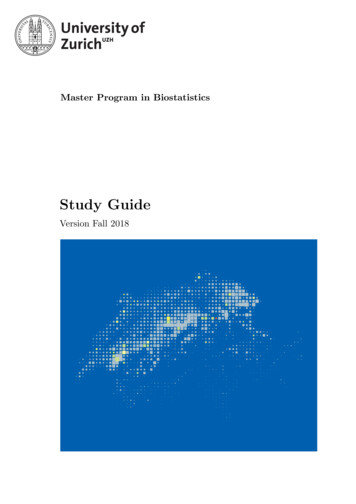
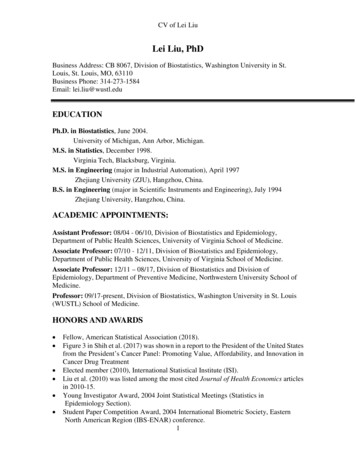
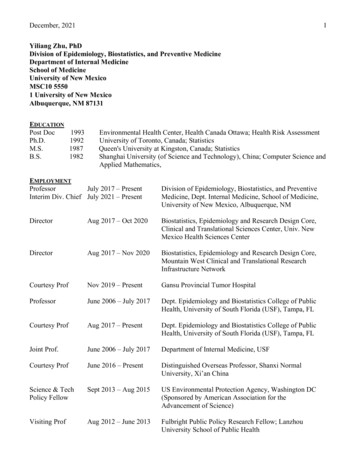
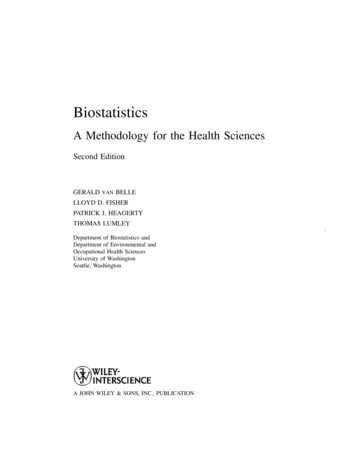
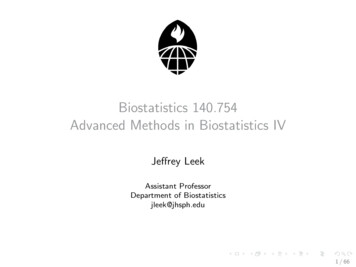
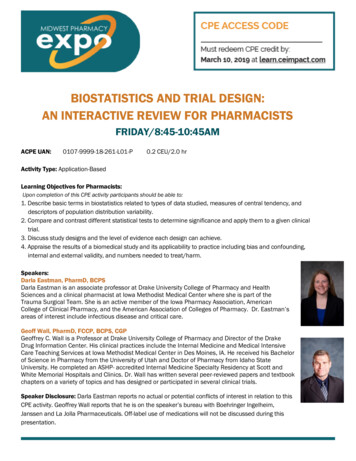

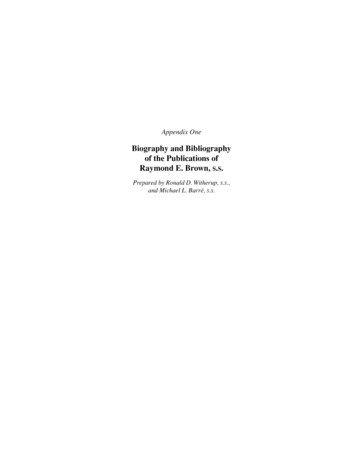
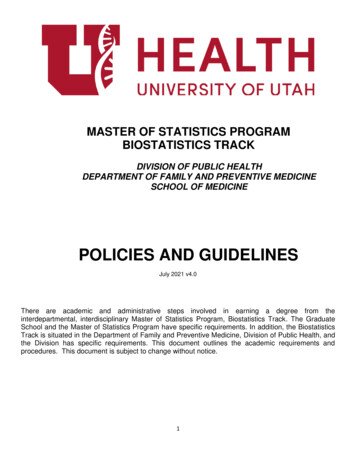
![Clinical Biostatistics [CLB]](/img/6/study-guide-clb-2021.jpg)
